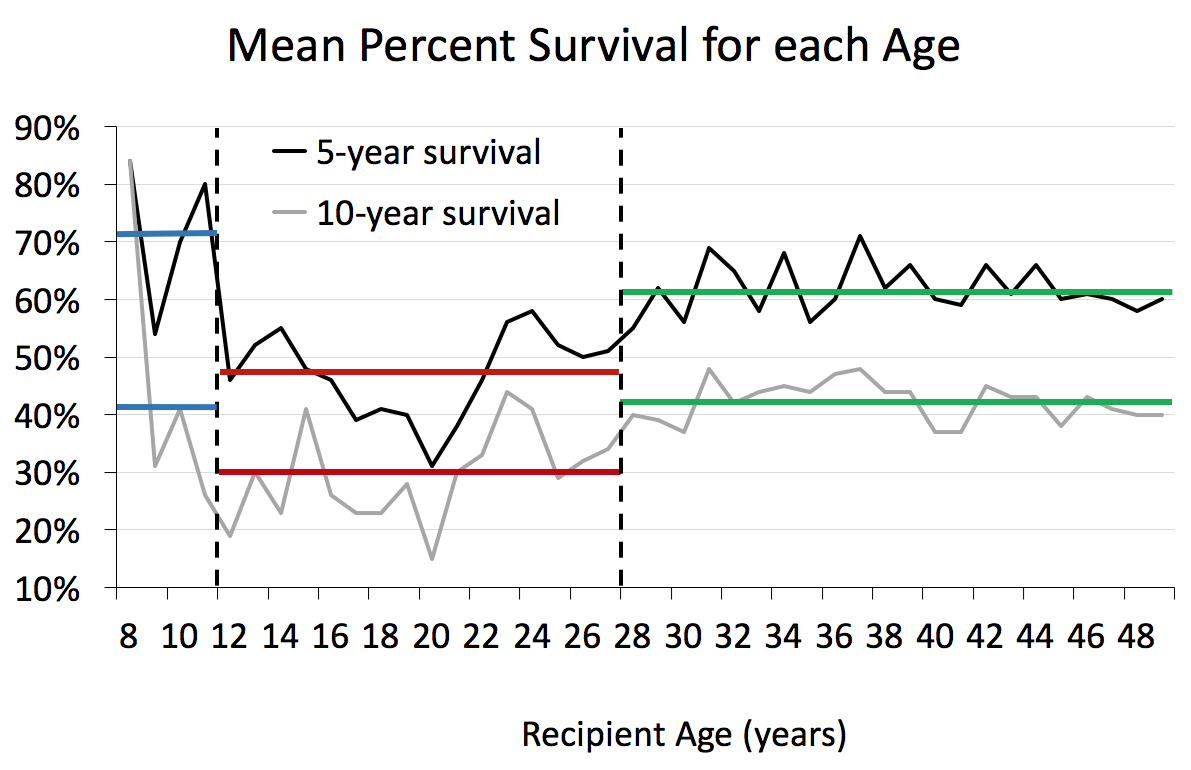Outcomes After Lung Transplant: Being a Teenager Does Not Stop at Age 18.
1Cardiothoracic Surgery, Cincinnati Children's Hospital, Cincinnati, OH
2Pulmonary Medicine, Cincinnati Children's Hospital, Cincinnati, OH
Meeting: 2017 American Transplant Congress
Abstract number: B240
Keywords: Lung transplantation
Session Information
Session Name: Poster Session B: Lung Transplantation Poster Session
Session Type: Poster Session
Date: Sunday, April 30, 2017
Session Time: 6:00pm-7:00pm
 Presentation Time: 6:00pm-7:00pm
Presentation Time: 6:00pm-7:00pm
Location: Hall D1
Recipient age at lung transplantation impacts survival. Adolescent recipients grouped by legal age definition (12-18) have been shown across all types of solid organ transplantation to have worse long-term outcomes presumably from non-compliance. We analyzed the association between age at lung transplant and survival to determine if this negative “adolescent” effect on outcomes is limited to this accepted age range or extends to young adult or pre-teens.
Patients receiving a lung transplant between 8 and 49 years of age from 2001-2015 were identified using UNOS/OPTN dataset. Kaplan-Meier survival was examined for each year of recipient age to identify inflection points. 5 and 10 year mean survival rates were compared. Medication compliance (2001-2005) characteristics were analyzed.
Analysis included 6457 patients. Kaplan-Meier survival was worse for 12-27 year old (p<0.01) vs. younger and older patients [figure 1]. Ages 12 and 27 years at transplantation were inflection points of increased and decreased mortality, respectively. Dividing patients into three age cohorts; 8-11 years (93 patients), 12-27 (1952) and 28-49 (4412) also showed worse mean 5 and 10 year survival for 12-27 yr old recipients (p<0.01) [figure 2]. Medication non-compliance event rates were higher for 12-27 year old vs. older patients, (3.71 vs. 1.21 /100,000 days, p<0.01) but neither was different than younger patients (2.41/100,000).
Adolescent and young adult lung transplant recipients (12-27 years) have worse survival than younger children and adults (28-49 years). Grouping patient survival/outcomes by the traditional/administrative definition misses a vulnerable young adult (19-27 years) population in need of additional scrutiny and care.

CITATION INFORMATION: Baker R, Rizwan R, Bryant III R, Schecter M, Towe C, Tweddell J, Zafar F, Morales D. Outcomes After Lung Transplant: Being a Teenager Does Not Stop at Age 18. Am J Transplant. 2017;17 (suppl 3).
To cite this abstract in AMA style:
Baker R, Rizwan R, III RBryant, Schecter M, Towe C, Tweddell J, Zafar F, Morales D. Outcomes After Lung Transplant: Being a Teenager Does Not Stop at Age 18. [abstract]. Am J Transplant. 2017; 17 (suppl 3). https://atcmeetingabstracts.com/abstract/outcomes-after-lung-transplant-being-a-teenager-does-not-stop-at-age-18/. Accessed March 2, 2026.« Back to 2017 American Transplant Congress
